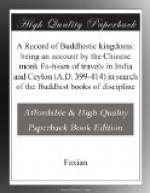the name for Buddhist monks, as those who have separated
themselves from (left) their families, and quieted
their hearts from all intrusion of desire and lust.
“It is employed, first, as a general name
for ascetics of all denominations, and, secondly, as
a general designation of Buddhistic monks.”
E. H., pp. 130, 131.
(7) Tartar or Mongolian.
(8) Woo-e has not been identified. Watters ("China Review,” viii. 115) says:—“We cannot be far wrong if we place it in Kharaschar, or between that and Kutscha.” It must have been a country of considerable size to have so many monks in it.
(9) This means in one sense China, but Fa-hien, in his use of the name, was only thinking of the three Ts’in states of which I have spoken in a previous note; perhaps only of that from the capital of which he had himself set out.
(10) This sentence altogether is difficult to construe, and Mr. Watters, in the “China Review,” was the first to disentangle more than one knot in it. I am obliged to adopt the reading of {.} {.} in the Chinese editions, instead of the {.} {.} in the Corean text. It seems clear that only one person is spoken of as assisting the travellers, and his name, as appears a few sentences farther on, was Foo Kung-sun. The {.} {.} which immediately follows the surname Foo {.}, must be taken as the name of his office, corresponding, as the {.} shows, to that of le maitre d’hotellerie in a Roman Catholic abbey. I was once indebted myself to the kind help of such an officer at a monastery in Canton province. The Buddhistic name for him is uddesika=overseer. The Kung-sun that follows his surname indicates that he was descended from some feudal lord in the old times of the Chow dynasty. We know indeed of no ruling house which had the surname of Foo, but its adoption by the grandson of a ruler can be satisfactorily accounted for; and his posterity continued to call themselves Kung-sun, duke or lord’s grandson, and so retain the memory of the rank of their ancestor.
(11) Whom they had left behind them at T’un-hwang.
(12) The country of the Ouighurs,
the district around the modern
Turfan or Tangut.
(13) Yu-teen is better known as Khoten. Dr. P. Smith gives (p. 11) the following description of it:—“A large district on the south-west of the desert of Gobi, embracing all the country south of Oksu and Yarkand, along the northern base of the Kwun-lun mountains, for more than 300 miles from east to west. The town of the same name, now called Ilchi, is in an extensive plain on the Khoten river, in lat. 37d N., and lon. 80d 35s E. After the Tungani insurrection against Chinese rule in 1862, the Mufti Haji Habeeboolla was made governor of Khoten, and held the office till he was murdered by Yakoob Beg, who became for a time the conqueror of all Chinese Turkestan. Khoten produces fine linen and cotton stuffs, jade ornaments, copper, grain, and fruits.” The name in Sanskrit is Kustana. (E. H., p. 60).




